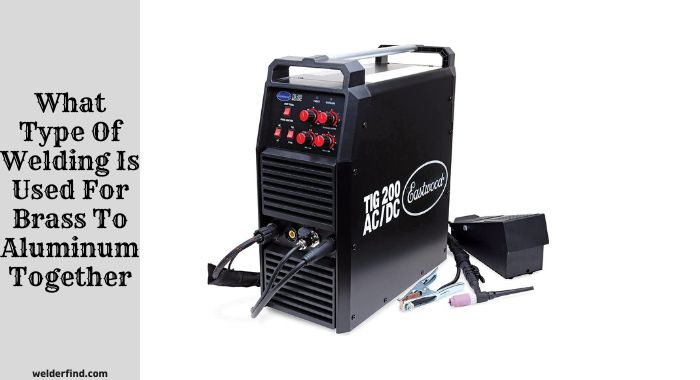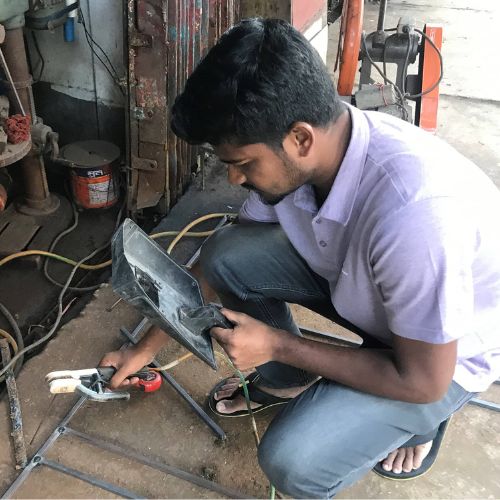Brass is a composition of various alloys of Zinc and copper. But can you weld brass to aluminum? Established welders will not face as difficulties as beginners will.
Here, you will learn how to weld brass to aluminum and what items you need. Let’s dive in!
Can I Weld Brass to Aluminum?
All brass materials have two primary items: Zinc and copper. Copper has a higher melting point than Zinc. Thus, you need to be cautious to avoid overheating.
Otherwise, it will cause severe damage to the weld. Cracking, porous welding, and other discontinuities will be common scenarios in this condition.
Welding brass to aluminum will not be as easy as other materials. But it is not impossible. Knowing the right technique and using the necessary items matters most.
What Type Of Welding Is Used For Brass To Aluminum Together?

You can’t use all welding procedures to weld brass to aluminum. Tungsten Inert Gas (TIG) welding is the best approach to combining brass and aluminum together.
Since it uses a non-consumable tungsten electrode for welding, the primary materials will be less affected.
What You Need
Some essential items are a must to weld brass to aluminum. For example, you will need flexible adhesives for welding. Avoid using any rigid adhesives. They will break away easily.
Another essential item is to use a special filler rod. Silicon Bronze rod comes in handy due it its decent hardness rating and yield strength. Its lower melting point makes welding easier.
Additionally, many welders prefer to use some form of glue to attach aluminum and brass together. Their variations in compositions will not affect the welding procedure.
How Do You Weld Brass To Aluminum?
An increased amount of thermal conductivity is noticeable in brass material. But, Zinc has a lower melting point.
During the TIG welding procedure, if melted Zinc boils and moves to the electrode, it can result in a temporary or permanent stoppage of the welding procedure.
That’s why it is essential to use a special filler rod to join brass and aluminum material together. Many welding experts recommended using Silicon Bronze rod because it has strong, pliable, and crack-resistant properties.
It is a convenient approach for items exposed to corrosives.
Additionally, using an AC power inverter with 30-second pulses each second will come in handy. Plus, the heat should be as less as possible.
Inspect the pool conditions after taking a break in every few seconds. Be extremely cautious to avoid overheating.
After joining the brass and aluminum, keep it under a colorless, odorless, inert gaseous element like Argon. This allows the joined metal to cool off faster.
The heated material should not be exposed to a typical environment. Or, you will see the presence of cavities in the weld metal.
Benefits and Cons of Welding Brass to Aluminum
Welding brass to aluminum has both advantages and disadvantages. If you want to bond brass to aluminum, you may use aluminum welder to do the job. Below are the crucial aspects you should not overlook.
1. Advantages of Welding Brass to Aluminum
You can weld brass to aluminum for mechanical fixings such as friction locks, rivets, screws, etc.
One of the main advantages of brass welding to aluminum is achieving a clean joint if you follow the proper welding procedure and use all the necessary items.
You won’t have to do much to get the final finish for the completed joint area. In addition, welding brass to aluminum ensures corrosion resistance joints.
No expensive secondary operation is required for bonding brass to aluminum through welding.
Besides, welding brass to aluminum ensures a protective sealing. If you do the project successfully, the result will last a long time.
2. Disadvantages of Welding Brass to Aluminum
Welding brass to aluminum is not suitable for any beginner welder. This process requires you to follow some cautious steps.
Plus, joining brass with aluminum is a time-consuming procedure. You need to maintain a frequent interval.
Cautiousness is extremely important while joining brass to aluminum through welding. Otherwise, it can lead to overheating issues.
Another problem with welding brass to aluminum is not having a perfectly matched color. But a, precise welding will give an almost similar result.
Does Welding Brass To Aluminum Create A Strong Bond?
Welding brass to aluminum can create a strong bond if you follow the correct welding approach and use the appropriate materials.
As we mentioned above, using a special filler rod is crucial to creating a strong bond between brass and aluminum.
But you need to be highly cautious. Zinc and copper are the two main components of brass. Zinc has a lower melting point, whereas copper has a higher one.
It is crucial to maintain an ideal temperature to avoid overheating.
Once you ensure the right temperature and use appropriate materials for welding, you can achieve a strong bond between these two different items.
As a solid rule of thumb, use some form of glue for better bonding between them.
What Metal Is Best To Weld With Brass?
Copper and Zinc are the best metals that can be welded with brass. However, you can also use gilding metals to weld with brasses.
In many cases, all nerves can be used if you follow the right approach for welding with brass.
However, it is better to choose lead-free brass for gas-shielded arc welding. Otherwise, it will lead to fume or porosity issues.
Frequently Asked Questions (FAQs)
How Can We Prevent Galvanic Corrosion Between Aluminum And Brass?
You can prevent galvanic corrosion between aluminum and brass by choosing materials with identical potentials and insulating the two metals separately.
Additionally, adding a protective coating to both materials and using a compatible size space to separate both spaces can prevent galvanic corrosion.
Can I Use Bronze Brazing Rod On Aluminum?
Yes, you can use a bronze brazing rod on aluminum using the heat of the metal pieces to bond two pieces of metals together. It should not be in direct contact with the flame of the torch.
Final Thought
Are you still wondering about this question: Can you weld brass to aluminum? Welding brass to aluminum requires maintaining a precise temperature and using the correct metal items.
And more importantly, be cautious about overheating the metal.
